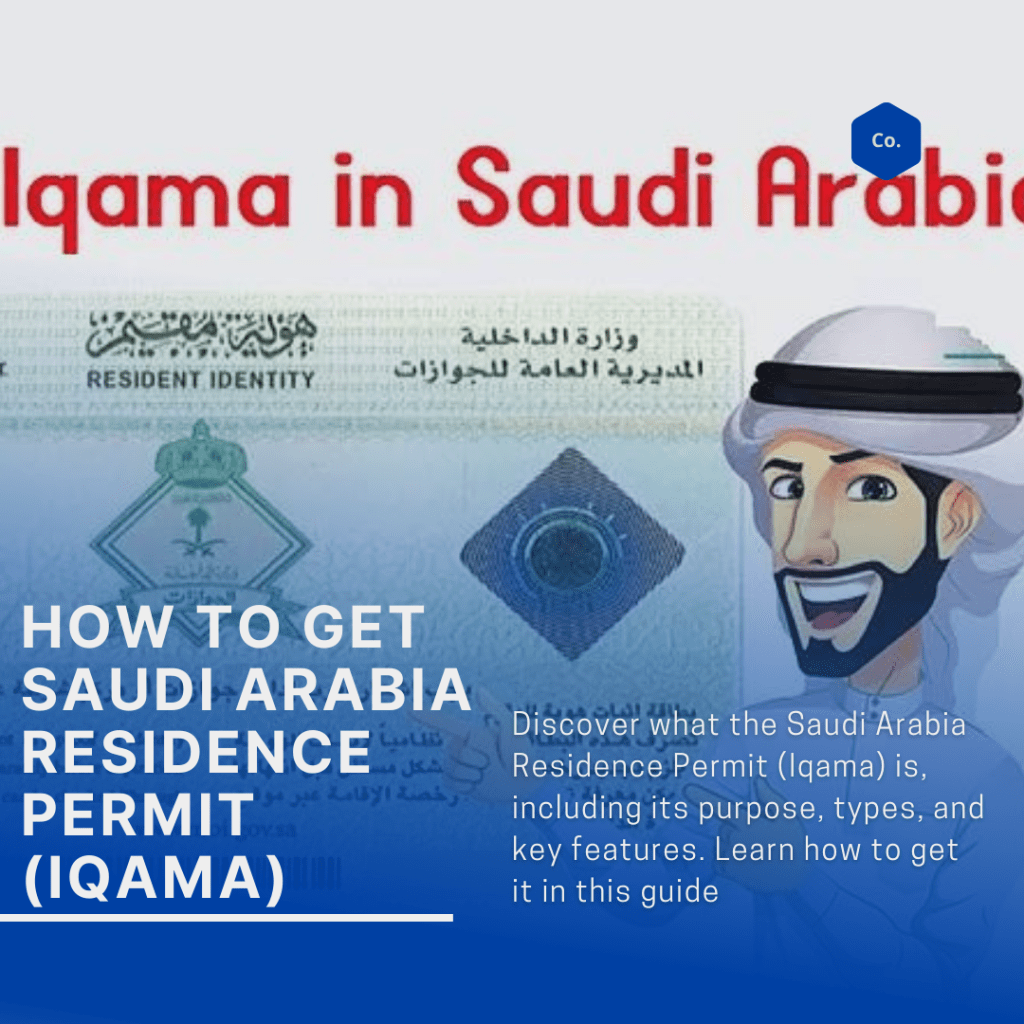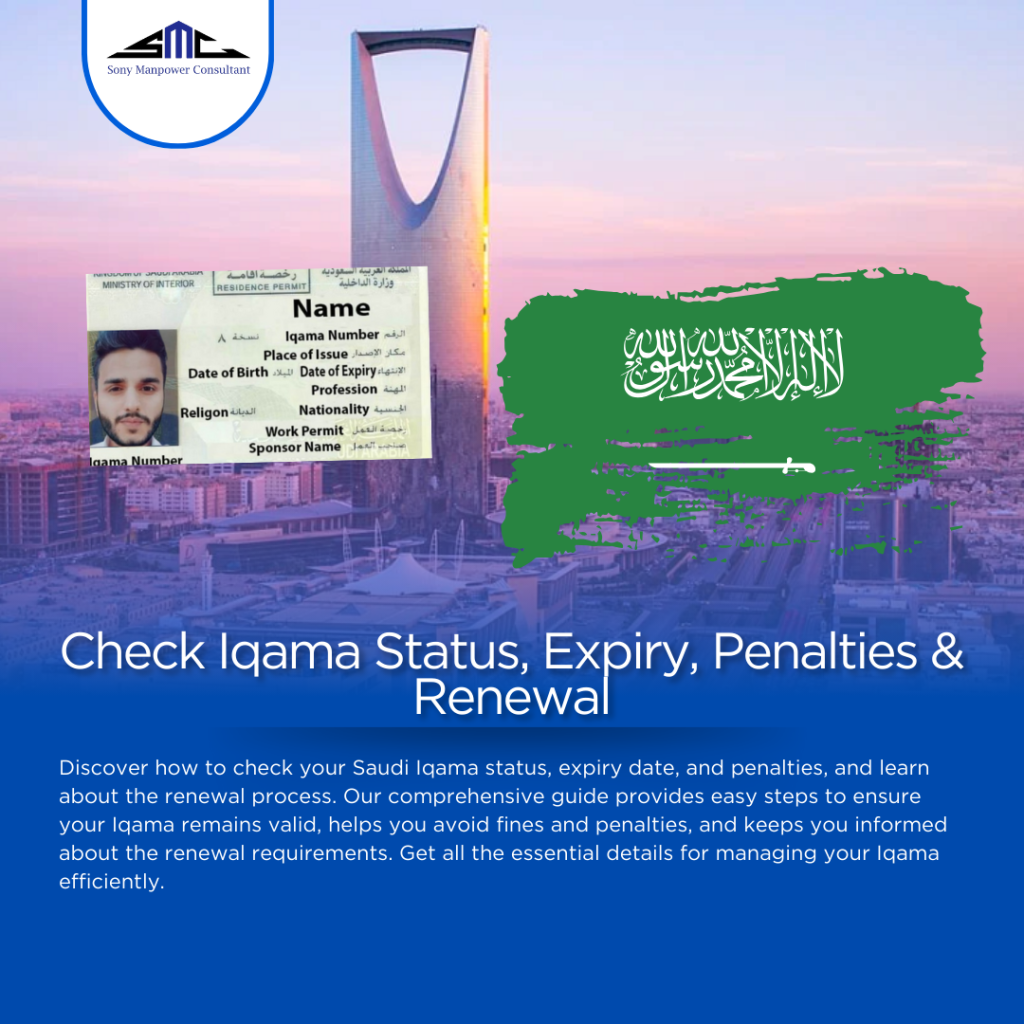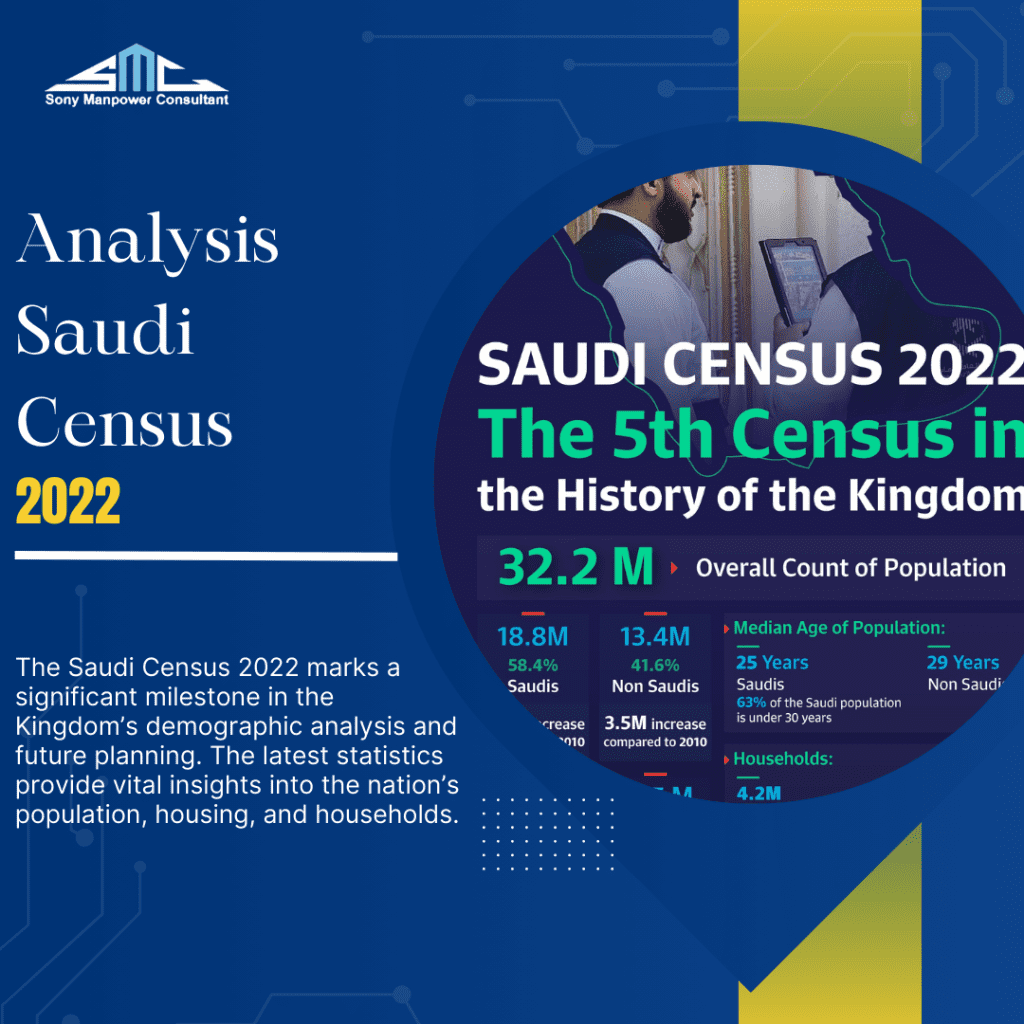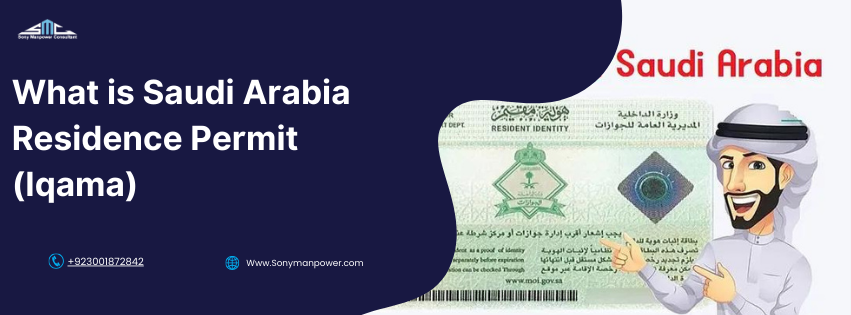What is Saudi Arabia Resident Identity Card (Iqama)

What is Saudi Arabia Resident Identity Card (Iqama) In Saudi Arabia, the term “Iqama” is very important for expatriates. This article will explain what Iqama is, and look at the different types issued by Saudi authorities. We’ll start with a simple overview of Iqama. Its purpose, and the various kinds available to expatriates living and working in Saudi Arabia. What is Iqama in Saudi Arabia? Iqama(residence permit) is an identity card issued by the Saudi government. That acts as a residency permit for expatriates living in the Kingdom of Saudi Arabia (KSA). Although It is closely linked to a sponsor, typically an employer, and serves as proof of legal residency. The Iqama allows expatriates to access various services and benefits in the country. Obtaining an Iqama can be complex. What is the Purpose of Iqama in Saudi Arabia? The Iqama(residence permit) in Saudi Arabia serves several key purposes. It is your official identification card and proof of legal residency. Primarily, it is essential for lawful employment. Showing your connection to a local sponsor and functioning as both your residence and work permit. This crucial document ensures you comply with immigration and work regulations. Providing a clear framework for expatriate employment in the Kingdom. If you need help with the Iqama (residence permit) process, consider the services of Sony ManPower Recruitment. They can provide valuable assistance in navigating the complexities of Saudi Arabia’s residency system. What Are the Benefits of Iqama in Saudi Arabia? Business Opportunities The Iqama( residence Permit) provides expatriates with the ability to establish and manage companies in Saudi Arabia while complying with foreign investment regulations. This facilitates entrepreneurial ventures and supports economic growth among expatriates. Travel Freedom With an Iqama, expatriates enjoy the freedom to enter and exit Saudi Arabia without needing a separate visa for each visit. This streamlined travel process enhances overall convenience and efficiency for residents. Family Visits The Iqama also allows expatriates to apply for visitor visas for family members, making it easier to facilitate family reunions and maintain close connections with loved ones. Active Participation in the Saudi Economy Aligning with Saudi Arabia’s Vision 2030, the Iqama integrates expatriates as integral contributors to the Saudi economy. It helps boost consumption by improving purchasing power, promotes economic activity across various sectors, supports the growth of small and medium enterprises, and creates job opportunities for Saudi citizens. Legal Framework and Consequences The Iqama operates within a legal framework that emphasizes accountability, requiring adherence to specific conditions. Non-compliance with these conditions can lead to the cancellation of the permit. Reasons for cancellation include providing false information, criminal convictions, or deportation orders, ensuring a transparent and lawful process. Who Needs Iqama (residence Permit) in Saudi Arabia? If you are planning to move to Saudi Arabia with your family, obtaining an Iqama is the first step, as it allows you to sponsor your spouse and/or children. For anyone moving to Saudi Arabia or staying for more than 90 days, an Iqama or Saudi ID Card is required. This card is essential for expatriates as it confirms their legal residency and provides access to various services and benefits within the country. If you plan to live and work in Saudi Arabia, having an Iqama or updating your iqama is crucial. How to find the iqama number by passport number To find your Iqama number using your passport number: Visit Absher Portal: Go to Absher.sa and log in. Navigate to Services: Find the option to query Iqama status. Enter Passport Number: Input your passport number and submit. View Iqama Number: Your Iqama number should appear if the details are correct. Alternatively, visit a Passport office (Jawazat) in Saudi Arabia with your passport for assistance. How Many Types of Iqama (Residence Permits) in Saudi Arabia? Saudi Arabia offers several types of Iqama to meet the diverse needs of expatriates: Domestic Worker Iqama: Issued to individuals employed as domestic workers, such as maids, drivers, and cooks. Labor Class Iqama: For expatriates working in lower-skilled labor positions. Professional Class Iqama: Designed for individuals in specialized or professional roles. Dependents Iqama: Granted to family members of expatriates, allowing them to reside in Saudi Arabia. Government Employees Iqama: Issued to expatriates working in government positions. Business Iqama: For expatriates who own or are involved in business operations in a country. Special Privileged Iqama (Green Card): A special residency permit that offers various benefits in Saudi Arabia. Let’s Explore Each Type of Iqama in Detail 1. Domestic Worker Iqama The Domestic Worker Iqama is issued to foreign household employees hired by Saudi citizens. This category includes positions such as housemaids, drivers, nannies, and watchmen. Holders of this Iqama have access to government hospital services. However, they cannot apply for permanent family visas or family visit visas. 2. Labor Class Iqama The Labor Class Iqama is granted to those workers in labor-intensive fields. Such as construction site workers, welders, plumbers, cleaners, and painters. Those with this Iqama receive insurance coverage from their sponsoring companies. 3. Professional Class Iqama Professional Class Iqama is designated for those individuals with professional degrees. Which includes doctors, nurses, engineers, and pharmacists. Professionals in this category working in the private sector receive insurance benefits from their employers. Holders of this Iqama can sponsor family members for visits and permanent stays and are eligible to apply for visas to countries like the UK and the USA. However, they may need to register with specific regulatory authorities in Saudi Arabia depending on their profession. 4. Dependents Iqama The Dependents Iqama is intended for the family members of expatriates or foreign workers. Which resides in Saudi Arabia. To obtain this Iqama, the expatriate must be present in Saudi Arabia under a permanent visa and initiate the application process for their family members. 5. Government Employees Iqama Foreign employees working in the government sector of Saudi Arabia receive the Government Employees Iqama. This permit allows them to access government sector services and sponsor family members for visits or permanent visas without incurring additional dependent fees.
How to Check Iqama Status, Expiry, Penalties & Renewal

How to Check Iqama Status, Expiry, Penalties & Renewal in Saudi Iqama: The Iqama, a residence permit, allows expatriates to live and work legally in Saudi Arabia. This important document is required for anyone entering the country on a work or dependent visa. It’s essential for opening a bank account, getting a SIM card, or applying for a driver’s license in Saudi Arabia. Often called the “Saudi Iqama,” it is issued by the Ministry of Interior and is tied to a person’s employment or sponsorship. The Iqama includes details such as the holder’s name, job, employer/sponsor, and the validity of their stay. Regularly check Iqama status. It is important to ensure legal residency and employment in Saudi Arabia. Purpose of Saudi Iqama The main purpose of the Iqama is to allow foreign workers and their dependents to live and work legally in Saudi Arabia. Types of Saudi Iqamas The Ministry of Interior in Saudi Arabia issues three main types of Iqamas: Domestic IqamaThis is issued to household workers like maids, nannies, and drivers. Labor IqamaCommonly issued to workers in labor-intensive jobs, such as construction or factory workers. Professional IqamaIt was issued to professionals with degrees from recognized universities or government institutions. Saudi Iqama Issuance Employers are responsible for sponsoring and applying for Iqamas for their foreign employees. Workers cannot apply for an Iqama directly. The process can take time and requires submitting various documents and paying associated fees. Requirements for Iqama Issuance To obtain an Iqama, expatriates and their sponsoring employers must provide certain key documents. While the specific requirements may vary based on the type of Iqama, the most common ones include: Active Work Permit Valid Employment Contract from the employer Health Insurance Clean Medical Certificate showing the expat is in good health The employer and the Ministry of Interior must work closely to ensure the application process runs smoothly, especially when there are updates to Saudi labor laws. Saudi Iqama Validity Iqamas are typically valid for one year and must be renewed at least three days before their expiration to avoid penalties. In certain cases, extensions may be granted under specific conditions. Information contained on the Saudi Iqama The Saudi Iqama is an official residence permit that provides detailed information about the expatriate and their legal status in the Kingdom. It is a crucial document, and the information it contains helps authorities verify the identity and employment status of the individual. The key details on the Iqama card include: NameThe Iqama displays the full name of the holder, matching their passport and other legal documents. PhotoA recent photograph of the holder is printed on the Iqama card for easy identification. NationalityThe nationality of the individual is mentioned. Indicating the country they are a citizen of. Date of BirthThe holder’s date of birth is printed on the card in the format used in Saudi Arabia. Which helps identify the individual and verify their age. ProfessionThe Iqama specifies the job title or profession of the holder, as stated in the employment contract. This information must align with the individual’s visa and work permit. Employer DetailsThe Iqama contains the name of the employer or sponsor, along with the company’s contact information. This is important for tracking the individual’s work authorization and ensuring they are working under the correct sponsorship. Expiry DateThe expiration date of the Iqama is printed. The holder must renew their Iqama before this date to avoid penalties or legal issues. These details make the Iqama a comprehensive document that serves as both an identification card and a legal permit for foreigners living and working in Saudi Arabia. Regularly checking the information on the Iqama ensures that all details are correct and up to date. The Importance of Saudi Arabia Iqama The Saudi Iqama is an essential document for foreign residents living in Saudi Arabia. It serves as both an identification card and a legal permit, making it a vital part of everyday life for expatriates. Here are some of the key reasons why the Iqama is so important: Mandatory to CarryForeign residents are required to carry their Iqama with them at all times. It acts as proof of their legal status in the country, and failure to present it upon request can lead to fines or penalties. 2). Required for Various PurposesThe Iqama is needed for several important activities, including: Renting an Apartment: Landlords will ask for a valid Iqama before leasing a property to an expatriate. Entering Government Buildings: The Iqama must be shown when visiting government offices for services like visa renewals, tax filings, or other legal matters. Obtaining a Saudi SIM Card: To purchase and register a mobile number, the Iqama is required as proof of residency. Traveling: While expatriates can travel within Saudi Arabia without issues, the Iqama is often required for certain processes, especially when re-entering the country after international travel. However, this may vary depending on the travel circumstances or visa type. Having an active and valid Iqama is crucial for accessing services and maintaining legal residency in Saudi Arabia. Without it, everyday tasks and activities can become difficult or even impossible. Why Saudi Arabia Check Iqama Status is Important Regularly checking your Saudi Arabia Iqama status is crucial for several reasons, as it affects various aspects of living and working in the country: Work AuthorizationYour Iqama is essential for legal work authorization. If your Iqama expires or becomes invalid, your ability to work legally may be compromised. Regular status checks help ensure that your work permit remains valid. Legal ComplianceStaying compliant with Saudi Arabian laws is important to avoid legal issues. Check Iqama status helps you ensure that your residence permit is up-to-date and that you are following all regulations. TravelFor both domestic and international travel, a valid Iqama is often required. An expired Iqama can cause complications during travel, including issues with re-entry into Saudi Arabia. Living ConditionsA valid Iqama is necessary for various day-to-day activities such as renting an apartment, obtaining utilities, and accessing government
Guide to Saudi Arabia Work Visa Processing in Pakistan

Guide to Saudi Arabia Work Visa Processing in Pakistan A Saudi work visa lets people from other countries work in Saudi Arabia. The visa lasts for one year and can be renewed up to three times. To get a visa in Pakistan, you need a job offer from a company in Saudi Arabia. Your employer will handle the visa application for you. This process can take around two months. Once your visa is approved. You need to go to the Saudi embassy or consulate in Pakistan to get your visa stamped. This can take up to two weeks. After your visa is stamped, you can go to Saudi Arabia and start your job. Recruitment agencies in Pakistan can help you with this whole process. Saudi Work Visa Requirement The requirements for a Saudi work visa depend on the applicant’s nationality. Generally, you will need: You may also need: For more information on the specific requirements for getting a visa, please contact the Saudi Embassy or Consulate in your country. Documents Required: The following documents are required for submission of documents to Saudi Embassy in Islamabad: You can find more information on the specific requirements for a Saudi work permit on the Saudi Embassy website. Stamping Process in Pakistan The application process for a Saudi work permit is as follows: Processing Time for a Saudi Work Visa The time it takes to process a Saudi work permit can differ based on the country you’re applying from. For instance, if you’re applying from Pakistan, it usually takes about 3-4 weeks, while applications from the United States may take around 6-8 weeks. After your visa is approved, you need to book an appointment at the Saudi embassy or consulate in your country to get your visa stamped. The stamping process typically takes 1-2 days, although this can vary by location. Once your visa is stamped, you can travel to Saudi Arabia and start working. Fees for Saudi Work Visa The fees for a Saudi work visa vary depending on the type of visa and the length of stay. For example, the fee for a single-entry work visa is SAR 2,000, while the fee for a multiple-entry work permit is SAR 3,000. The fee for a one-year work visa is SAR 5,000, while the fee for a two-year work visa is SAR 7,000. The fees for a Saudi visa can be paid in cash or by credit card. The fees must be paid in Saudi riyals. Validity of Saudi Work Visa A Saudi work visa is valid for one year and can be renewed for up to two more years, therefore allowing a total maximum validity of three years. To renew your Saudi visa, you need to submit the following documents to the Saudi embassy or consulate in your home country: Hence the processing time for renewing a Saudi visa usually takes about two to three weeks. Extensions of Saudi Work Visa A Saudi work permit can be extended for a maximum of two years. Also to extend your visa, you must submit the following documents to the Saudi embassy or consulate in your home country: The processing time for an extension of a Saudi work visa is typically two to four weeks. Do you want help from Saudi Visa Processing Experts from Pakistan? Get in touch with us right now! Transferring a Saudi Work Visa A Saudi work visa can be transferred to someone else if the original holder dies, becomes unable to work, or loses their job. Here’s how to transfer a Saudi visa: It’s important to remember that transferring a Saudi work visa is not automatic. Hence the original holder needs to make the request, and the new holder must meet all the requirements for a Saudi work visa. Hence this process can take several weeks, so it’s good to plan ahead. More Resources: Top Recruitment Agency In Pakistan For Saudi Arabia
Saudi Census 2022: From 2010 to 2022 Census Changes

Saudi Census 2022: From 2010 to 2022 Census Changes Understanding the Saudi Census 2022 The Saudi Census 2022 represents a major step in understanding the Kingdom’s demographic landscape. Conducted by the General Authority for Statistics (GASTAT), the census offers detailed insights into the population structure, housing conditions, and household composition in Saudi Arabia. These findings are crucial for shaping national policies and supporting Vision 2030 objectives. Snapshot of Saudi Arabia’s Population in 2022 According to the latest data, the population of Saudi Arabia stands at 32.2 million people. Out of this total: 58.4% (18.8 million) are Saudi citizens 41.6% (13.4 million) are expatriates Other notable demographics include: Median age: 29 years Youth population (Saudis under 30): 63% Male population: 19.7 million (61%) Female population: 12.5 million (39%) This distribution highlights the country’s youthful nature, with the majority of the population below the age of 30. Comparing 2010 and 2022 Census Results The 2022 census reveals significant demographic changes when compared to the 2010 figures: Data Point 2010 2022 Change Total Population 27.1 million 32.2 million +5.1 million Saudi Citizens 18.7 million 18.8 million +0.1 million Non-Saudis 8.4 million 13.4 million +5 million Median Age ~26.5 years 29 years Slight increase The most striking difference lies in the growth of the non-Saudi population, reflecting the Kingdom’s ongoing reliance on foreign workers. Youthful Energy: The Power of a Young Population One of the most important findings is the youthful demographic: over 63% of Saudis are under 30. This trend has direct implications for sectors like education, employment, housing, and healthcare. Planning for a future driven by youth requires investments in schools, job training, and modern infrastructure. Gender Breakdown and Implications The 2022 figures show a higher male population: Males: 19.7 million Females: 12.5 million This gender gap is partly due to the large number of male expatriate workers. Recognizing this distribution is important for designing gender-responsive services in health, employment, and education. Geographic Spread: Major Cities and Population Centers Saudi Arabia’s population is not evenly distributed. Urban centers like Riyadh, Jeddah, Makkah, Madinah, and Dammam have seen significant growth. Understanding this helps in efficient resource distribution and urban planning, especially for infrastructure, public services, and transportation systems. Housing Data: A Look into Residential Life The Kingdom now has over eight million residential units. Interestingly: Apartments make up 51% of all housing This reflects the rising trend of urbanization and the growing preference for apartment living in city areas. This data is essential for guiding real estate investments and housing development projects. Saudi Households: Composition and Size There are around 4.2 million Saudi families Average Saudi family size: 4.8 members Average non-Saudi family size: 2.7 members Among non-Saudis, men make up 76% of the group, a statistic that aligns with the employment-focused migration patterns into the country. Backcasting: How Far Has the Kingdom Come? The 2022 census uses a technique called backcasting to compare with past data: Population growth from 2010 to 2022: +8.2 million Saudi citizens increase: +4.8 million Non-Saudis increase: +3.5 million This method offers a deeper perspective on long-term population trends, helping decision-makers understand where growth is happening and why. Smart Data Collection: Technology Driving Accuracy The 2022 census benefited from technological advancements, including: Satellite mapping Self-enumeration tools Automated data verification With a confidence level of 95%, these tools ensured more precise data collection than ever before. Field visits and data correction techniques helped validate the information, boosting its reliability. Commitment to Transparency and Data Privacy GASTAT emphasized both data security and public transparency. By using international best practices and high confidentiality standards, the agency has built public trust and encouraged active participation in national statistics efforts. Policy Impact: Using Census Data for National Development The census provides a foundation for shaping economic and social strategies. It supports government goals such as: Developing inclusive education systems Expanding healthcare infrastructure Improving housing and transportation Supporting labor market reforms Moreover, the census directly contributes to realizing the goals of Vision 2030, helping Saudi Arabia build a thriving society, a vibrant economy, and an ambitious nation. Addressing Public Concerns: GASTAT’s Official Response Following the data release, some observers questioned discrepancies with previous figures (like those from 2015). GASTAT President Dr. Fahad Aldossari clarified: The 2022 census used cutting-edge tools for better accuracy Economic events, like the COVID-19 pandemic, influenced non-Saudi population trends Backcasting was applied to ensure continuity and understanding of past trends This response reinforces the reliability of the 2022 data and underlines GASTAT’s commitment to improving statistical practices. Conclusion: Saudi Census 2022 in Perspective The Saudi Census 2022 is more than just numbers—it’s a roadmap for the future. By leveraging modern technology, maintaining transparency, and analyzing population trends, Saudi Arabia has created a powerful tool for national development. As the country advances toward the goals set in Vision 2030, this data will be instrumental in guiding policy, shaping infrastructure, and ensuring sustainable growth. The insights from the census serve not only Saudi policymakers but also global investors and researchers looking to understand the Kingdom’s evolving dynamics. Frequently Asked Questions (FAQs) 1. What is the Saudi Census 2022, and why is it important?It’s a national population and housing survey that provides insights essential for planning infrastructure, services, and national development strategies. 2. What is the total population according to the 2022 census?32.2 million people, with 58.4% Saudis and 41.6% non-Saudis. 3. How does the 2022 census compare to the 2010 data?There has been a population growth of 8.2 million, including significant increases among both Saudis and expatriates. 4. What does the census say about housing in Saudi Arabia?There are over 8 million residential units, and apartments account for more than half of them. 5. How does the youthful population impact national planning?With 63% of Saudis under 30, the government needs to prioritize education, employment, and youth engagement initiatives. 6. What technologies were used in the 2022 census?Satellite imagery, self-reporting tools, automated error detection, and modern data analysis techniques. 7. How does the census support Vision 2030?It provides accurate, up-to-date data to
What is Saudi Arabia Resident Identity Card (Iqama)

What is Saudi Arabia Resident Identity Card (Iqama) In Saudi Arabia, the term “Iqama” is very important for expatriates. This article will explain what Iqama is, and look at the different types issued by Saudi authorities. We’ll start with a simple overview of Iqama. Its purpose, and the various kinds available to expatriates living and working in Saudi Arabia. What is Iqama in Saudi Arabia? Iqama(residence permit) is an identity card issued by the Saudi government. That acts as a residency permit for expatriates living in the Kingdom of Saudi Arabia (KSA). Although It is closely linked to a sponsor, typically an employer, and serves as proof of legal residency. The Iqama allows expatriates to access various services and benefits in the country. Obtaining an Iqama can be complex. What is the Purpose of Iqama in Saudi Arabia? The Iqama(residence permit) in Saudi Arabia serves several key purposes. It is your official identification card and proof of legal residency. Primarily, it is essential for lawful employment. Showing your connection to a local sponsor and functioning as both your residence and work permit. This crucial document ensures you comply with immigration and work regulations. Providing a clear framework for expatriate employment in the Kingdom. If you need help with the Iqama (residence permit) process, consider the services of Sony ManPower Recruitment. They can provide valuable assistance in navigating the complexities of Saudi Arabia’s residency system. What Are the Benefits of Iqama in Saudi Arabia? Business Opportunities The Iqama( residence Permit) provides expatriates with the ability to establish and manage companies in Saudi Arabia while complying with foreign investment regulations. This facilitates entrepreneurial ventures and supports economic growth among expatriates. Travel Freedom With an Iqama, expatriates enjoy the freedom to enter and exit Saudi Arabia without needing a separate visa for each visit. This streamlined travel process enhances overall convenience and efficiency for residents. Family Visits The Iqama also allows expatriates to apply for visitor visas for family members, making it easier to facilitate family reunions and maintain close connections with loved ones. Active Participation in the Saudi Economy Aligning with Saudi Arabia’s Vision 2030, the Iqama integrates expatriates as integral contributors to the Saudi economy. It helps boost consumption by improving purchasing power, promotes economic activity across various sectors, supports the growth of small and medium enterprises, and creates job opportunities for Saudi citizens. Legal Framework and Consequences The Iqama operates within a legal framework that emphasizes accountability, requiring adherence to specific conditions. Non-compliance with these conditions can lead to the cancellation of the permit. Reasons for cancellation include providing false information, criminal convictions, or deportation orders, ensuring a transparent and lawful process. Who Needs Iqama (residence Permit) in Saudi Arabia? If you are planning to move to Saudi Arabia with your family, obtaining an Iqama is the first step, as it allows you to sponsor your spouse and/or children. For anyone moving to Saudi Arabia or staying for more than 90 days, an Iqama or Saudi ID Card is required. This card is essential for expatriates as it confirms their legal residency and provides access to various services and benefits within the country. If you plan to live and work in Saudi Arabia, having an Iqama or updating your iqama is crucial. How to find the iqama number by passport number Visit Absher Portal: Go to Absher.sa and log in. Navigate to Services: Find the option to query Iqama status. Enter Passport Number: Input your passport number and submit. View Iqama Number: Your Iqama number should appear if the details are correct. Alternatively, visit a Passport office (Jawazat) in Saudi Arabia with your passport for assistance. How Many Types of Iqama (Residence Permits) in Saudi Arabia? Saudi Arabia offers several types of Iqama to meet the diverse needs of expatriates: Domestic Worker Iqama: Issued to individuals employed as domestic workers, such as maids, drivers, and cooks. Labor Class Iqama: For expatriates working in lower-skilled labor positions. Professional Class Iqama: Designed for individuals in specialized or professional roles. Dependents Iqama: Granted to family members of expatriates, allowing them to reside in Saudi Arabia. Government Employees Iqama: Issued to expatriates working in government positions. Business Iqama: For expatriates who own or are involved in business operations in a country. Special Privileged Iqama (Green Card): A special residency permit that offers various benefits in Saudi Arabia. Let’s Explore Each Type of Iqama in Detail 1. Domestic Worker Iqama The Domestic Worker Iqama is issued to foreign household employees hired by Saudi citizens. This category includes positions such as housemaids, drivers, nannies, and watchmen. Holders of this Iqama have access to government hospital services. However, they cannot apply for permanent family visas or family visit visas. 2. Labor Class Iqama The Labor Class Iqama is granted to those workers in labor-intensive fields. Such as construction site workers, welders, plumbers, cleaners, and painters. Those with this Iqama receive insurance coverage from their sponsoring companies. 3. Professional Class Iqama Professional Class Iqama is designated for those individuals with professional degrees. Which includes doctors, nurses, engineers, and pharmacists. Professionals in this category working in the private sector receive insurance benefits from their employers. Holders of this Iqama can sponsor family members for visits and permanent stays and are eligible to apply for visas to countries like the UK and the USA. However, they may need to register with specific regulatory authorities in Saudi Arabia depending on their profession. 4. Dependents Iqama The Dependents Iqama is intended for the family members of expatriates or foreign workers. Which resides in Saudi Arabia. To obtain this Iqama, the expatriate must be present in Saudi Arabia under a permanent visa and initiate the application process for their family members. 5. Government Employees Iqama Foreign employees working in the government sector of Saudi Arabia receive the Government Employees Iqama. This permit allows them to access government sector services and sponsor family members for visits or permanent visas without incurring additional dependent fees. 6. Business Iqama The Business Iqama is for individuals


